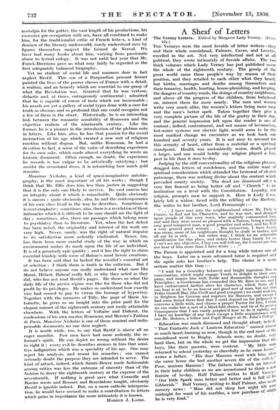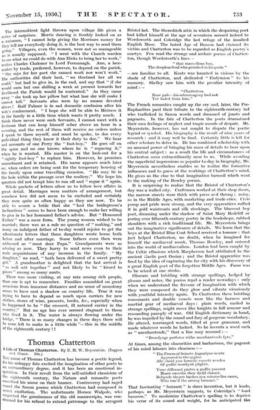A Sheaf of Letters
Tux Verneys were the most lovable of letter writers—they and their whole eousinhood, Palmers, Caves, and Lovetts,
excelled in the art. Not very intellectual and not at all political, they wrote intimately of fireside affairs. The two thick volumes which Lady Verney has just published cover
the whole of the eighteenth century. The gossip of the great world came these people's way by reason of their position, and they retailed to each other what they heard, but births, marriages and deaths among themselves and their tenantry, health, hunting, house-plenishing, and keeping, the dangers of country roads, the doings of country neighbours, and above all the progress of the children, from babyhood on, interest them far more nearly. The men and women write very much alike, the women's letters being more racy and the men's better spelt. Taken together they give a very complete picture of the life of the gentry in their day, and the general impression left upon the reader is one of content ; indeed, contentment, and not means of locomotion, hot-water systems nor electric light, would seem to be the most marked change we enchanter as we look back one hundred and seventy years. It is not easy to account for this serenity of heart, either from a material or a spiritual standpoint. Health was undoubtedly worse, death played a larger, and one would boldly say religion played a less, part in life than it does to-day.
Judging by the stiff conventionality of the religious phrases, dragged into letters of condolence, and the entire want of spiritual consideration which attended the bestowal of &loch patronage, there was nothing divine about the content wItich pervaded county society. The dead are dismissed after a very fine funeral as being better off and " Church " an institution on a level with the Constitution. Loyalty, not religion, prompts men to support it. Here is Lady Cave, lately left a widow, faced with the refilling of the Rectory. She writes to her brother, Lord Fermanagh :— " . . . I have sent into the neighbourhood where Mr. Pinly Curate, to find out his Character, and he was met, and dropped upon people of this very town, who mightily commended him, and said they were never so pleased with a Parson, being a mighty easy good-tempered man, a good preacher and sober, and his Wife a very genteel good woman . . . His extraction, I have heart, was mean, some of his neighbours thought he dealt in timber, and all say he is rich . . . but either way, I think tis an admirable qualification for this place, and riches better than family for us. 1 can't see any objection, I beg you will tell me, for I never saw him nor hear of him more than I have wrote . . ."
The Parson is appointed and for a long while tutors one of the boys. Later on a more advanced tutor is required and she again asks her brother's help. The choice is a more serious matter this time :- " I wish for a Gentelley behaved and bright ingenious Man in conversation, which might engage Youth to delight in their coin• pany, and inspire him with Noble and Honourable thoughts and Principles ; a Gentleman has comended this Mr. Brae to me, and I have endeavoured farther after his character, which from all I can hear is ad. to be an honest and good sort of man, but not that Polite Gentell Man (tho Civill and good temperd.) we could wish for, to Brighten his Genious and improve his Manners, and except I had some freind there first that I coud depend on for judgment to convene a little with, and choose a proper Tuetor for him, I think we can make but a sort of a blind-fold choice, and tis of So gnat a Consequence that I am vastly porplex'd how to do it rightly, and I have no knowlige of any there except a little acquaintance with one Mr. Holmes, a fellow and Pupil Monger at St. John's College."
Education was much discussed and thought about, indeed, " That Fantastic Jack o' Lantern Education " caused ahnost as much heart-burning as now, though in the end most of the cousinhood went to Rugby. Schools were, no doubt, very hard then, but on the whole we get the impression that the boys, like their parents, were content. " My little man, returned to school yesterday as cheerfully as he came home, writes a father. " His dear Mamma went with him, afro she came home she had another severe fitt of the colliek." Poor, anxious Mamma I The fathers take such an interot in their baby children as we are accustomed to think a nes feature of to-day. Ralf Palmer writes to Ralf Verney: " Our little Spark runs better and better and is full of hit Gibberish." Ralf Verney, writing to Ralf Palmer, also seeds nursery news : "Mine did not sleep last night till 'mu midnight for -want:of his marbles; a new purchase of whiell he is very fond." The intermittent light thrown upon village life gives a series of surprises. Morris dancing is frankly looked on as a nuisance, " I cannot help giving the Morrisses money for they tell me everybody doing it, is the best way to send them going." Villagers, even the women, were not so manageable as is usually supposed. " I went with the Church warden to see what we could do with Ann Hicks to bring her to work," writes Charles Chaloner to Lord Fermanagh. Ann, a lace- wager by trade, preferred, however, to depend on the parish. She says for her part she cannot work nor won't work." The authorities did their best, " we thretned her all we could," but had to give in, in the end, and say that " if she would earn but one shilling a week at present towards her livelihood the Parish would he contented." As they came away " she took up her pillow but what lase she will make I cannot tell." Servants also were by no means devoted slaves 1 Ralf Palmer is in sad domestic confusion after his wife's confinement. " I hope she will be able to Mistress it in the family in a little time which wants it pretty much. I think there never were such Servants, I cannot meet with a footman that can keep himself sober above an hour in a morning, and the rest of them will receive no orders unless I speak to them myself, and must be spoke, to doe every individual thing they know it their duty to doe." We hear sad accounts of one Perry the " foot-boy." He goes off on the spree and no one knows where he is " rogueing it," when he is wanted. His master is on the look-out for a "sightly foot-boy" to replace him. However, he promises amendment and is retained. His name appears much later on, when orders are being sent for the temporary housing of the family upon some travelling occasion. " He may lie in the hole within the passage over the scullery." We hope his quarters did not tempt him to run off and " rogue it " again. Whole packets of letters allow us to follow love affairs in great detail. Marriages were matters of arrangement, but somehow love did not seem to be excluded and certainly they were quite as often happy as they are now. To be able to assure a bride that she " had the bridegroom's inclinations " seems to have been enough to make her willing to give in to her honoured father's advice. But " Honoured Father " was a mere form. The young women wished to be married; there was as a rule no question of " making," and many an indulgent father of to-day would rejoice to get the affectionate letters that these daughters wrote home both before and after marriage. Some fathers even then were addressed as " most dear Papa." Grandparents were as adoring as now. They hurry to send news even to their male acquaintance of any increase in the family. " My daughter," we read, " hath been delivered of a sweet pretty girl." A grandmother is delighted that the last arrival is " so well sett together " and not likely to be " kissed to pieces " among so many aunts.
There was snore visiting, at any rate among rich people, than one is apt to remember. Families assembled on great occasions from immense distances and no sense of monotony seems to have cast a shadow on country life. True it was trying to have to depend so much upon carriers for new clothes, stores of wine, presents, books, &c., especially when he happened to be " the crassest, ill natured carrier in the country;" But no age has ever seemed stagnant to those who lived in it. The water is always flowing under the bridge, " There is so many changes in these days there will be none left to make in a little while "—this in the middle of the eighteenth century 1 I









































 Previous page
Previous page